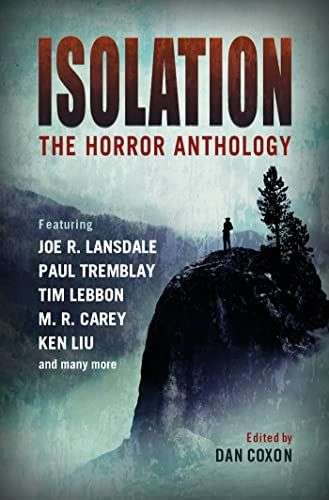Isolation: The Horror Anthology, edited by Dan Coxon
Titan books, paperback, £8.99
Reviewed by Shona Kinsella

I’ve long been a fan of Dan Coxon’s anthologies. As an editor, he never fails to put together a selection of the very finest short fiction, and Isolation: The Horror Anthology is no exception. Isolation is often a key component of horror stories, whether that’s in the physical sense, such as being trapped alone in a cabin in the woods, or whether it’s in the mental sense, trapped inside our own heads, unable to connect with others for various reasons. After the last few years, we’re all too aware of the dangers and discomforts of being isolated from our loved ones and our communities.
Overflowing with renowned authors, there’s bound to be a story in here for any horror lover, as the authors all tackle the theme from different perspectives. Every story has something to offer, but I’ll focus on a few of my favourites here.
The book opens with the incredibly strong The Snow Child by Alison Littlewood. This story is creepy and atmospheric, leading us out into the Swedish wilds, where the snow covers a multitude of sins. This story deals with isolation both in the physical sense – they are in a cabin in the woods, miles from civilisation – and the emotional sense, as the relationship between the young woman and her mother is strained almost to the breaking point. A descent into madness is a common horror trope, and this story does it in reverse, beginning with the assumption that one of the characters has been alone so long that they’ve gone mad, only to discover that something a whole lot stranger is going on.
Friends for Life by Mark Morris comes next and is a new take on an old theme. Daniel has always been a bit of a loner, but the pandemic, combined with the death of his mother, leaves him feeling particularly alone. He decides to give a local group, Friends for Life, a try and surprises himself by quickly making connections. He’s even more surprised when he finds himself agreeing to a weekend trip away with a couple of them. Folk horror that follows a familiar path but does it very well indeed.
Solivigant by A.G.Slatter shows the isolation a young woman in an abusive relationship faces, unable to reach out or make friends for fear of what will happen when her vampire boyfriend finds out about it. This story may be difficult to read for some due to the nature of this relationship, but it turns expectations on their heads with a very clever twist. I loved it.
How We Are by Chikodili Emelumadu is beautifully written and compelling, filled with sadness as well as horror. Gifty has the ability to tell when someone is sick just by looking at them. But the gift can also make people sick – and Gifty’s grandmother makes use of this skill to sell potions and ointments to rich people. When a friend from school learns about the ‘gift’, it isn’t long before she asks for help.
The Peculiar Seclusion of Molly McMarshall by Gwendolyn Kiste is written in the epistolary style, built from blog posts, missing posters and news reports. Molly McMarshall enters her home one day and does not emerge again. She stands unmoving at the window and fails to respond to contact from neighbours, friends or family. At first, the situation is merely regarded as peculiar – until people begin to notice a strange, dark presence lingering in the house behind her.
As with any anthology, I enjoyed some of the stories more than others, but every offering was of high quality and deserved its place. An excellent anthology, highly recommended.

